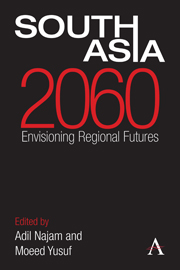Book contents
- Frontmatter
- Contents
- Acknowledgments
- List of Abbreviations
- Introduction: Imagining South Asian Futures
- Section I South Asia as a Region
- Section II State Relations
- Chapter 6 The Future of Democracy
- Chapter 7 Conflict and Reconciliation: Three Scenarios
- Chapter 8 Religion and State Formation
- Chapter 9 Will South Asia Still Be Terrorism's Center of Gravity?
- Chapter 10 Speculations on Nuclear South Asia
- Chapter 11 Nuclear Risk: Overstated or Underrated?
- Chapter 12 The Shadow of the India–Pakistan Stalemate
- Chapter 13 Regional Integration
- Chapter 14 The Future of Integration
- Chapter 15 The Giant Neighbor: Why is China Important?
- Section III Development
- Section IV Human Well-Being
- About the Authors
- Bibliography
- Index
Chapter 11 - Nuclear Risk: Overstated or Underrated?
from Section II - State Relations
Published online by Cambridge University Press: 05 September 2013
- Frontmatter
- Contents
- Acknowledgments
- List of Abbreviations
- Introduction: Imagining South Asian Futures
- Section I South Asia as a Region
- Section II State Relations
- Chapter 6 The Future of Democracy
- Chapter 7 Conflict and Reconciliation: Three Scenarios
- Chapter 8 Religion and State Formation
- Chapter 9 Will South Asia Still Be Terrorism's Center of Gravity?
- Chapter 10 Speculations on Nuclear South Asia
- Chapter 11 Nuclear Risk: Overstated or Underrated?
- Chapter 12 The Shadow of the India–Pakistan Stalemate
- Chapter 13 Regional Integration
- Chapter 14 The Future of Integration
- Chapter 15 The Giant Neighbor: Why is China Important?
- Section III Development
- Section IV Human Well-Being
- About the Authors
- Bibliography
- Index
Summary
Few manmade events would change the nature of South Asia more than the use of nuclear weapons in anger. In 40 years of bitter rivalry the United States and the Soviet Union never used their nuclear weapons against each other. India and Pakistan have similarly not been drawn into full blown conflict in the 12 years since they declared their nuclear weapons capability, despite multiple aggravations. Have the risks been overstated and has nuclear deterrence made South Asia safer than before? Or should more be done to reduce the risks, however small they may be, because of the dire consequences of any use of nuclear weapons? And are these consequences adequately appreciated by other countries in the South Asian region?
Many South Asians regard India and Pakistan's possession of nuclear weapons as primarily a bilateral matter between those two countries. The issue is tied up with the complexities surrounding the birth pangs of those two nations, the Kashmir dispute and the several wars and alarms which have arisen over the last six decades. The other six member countries of the South Asian Association for Regional Cooperation (SAARC) are ready for the Association to be used as a vehicle for alleviating tensions so far as might be possible and without investing too much hope in the prospect. But experience has shown that there is little to be gained from volunteering opinions about the differences between India and Pakistan, still less from assuming a proactive role in attempting to resolve them.
- Type
- Chapter
- Information
- South Asia 2060Envisioning Regional Futures, pp. 90 - 95Publisher: Anthem PressPrint publication year: 2013



